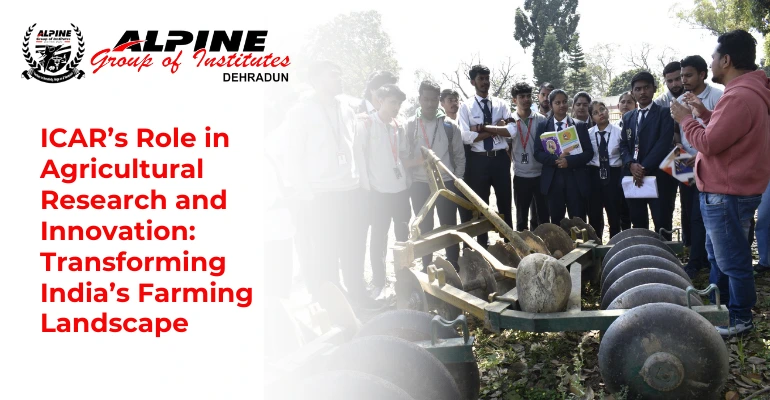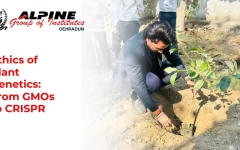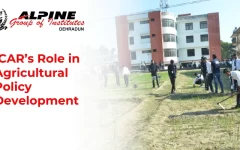ICAR’s Role in Agricultural Research and Innovation: Transforming India’s Farming Landscape
2024-12-16 9:38ICAR’s Role in Agricultural Research and Innovation: Transforming India’s Farming Landscape

ICAR’s Role in Agricultural Research and Innovation: Transforming India’s Farming Landscape
The Indian Council of Agricultural Research (ICAR) has long been a beacon of agricultural research and innovation, playing a pivotal role in shaping India’s agricultural sector. Through its research institutions, partnerships, and ground-breaking initiatives, ICAR has significantly improved farming practices, crop production, and rural livelihoods. As the world faces an era of climate change, resource scarcity, and growing food demands, ICAR’s innovative solutions are critical to ensuring sustainable agricultural practices and food security for India.
ICAR’s Contributions to Agricultural Research: A Game Changer for Indian Farming
India’s agricultural sector is facing immense challenges, including climate variability, pest infestations, and a growing demand for food due to a rising population. Over the years, ICAR has been instrumental in driving agricultural research that addresses these issues and more. With over 100 research institutes, ICAR has been a key player in transforming Indian farming, making it more resilient, productive, and sustainable.
Key Contributions:
- Crop Research and Improvement: ICAR’s extensive research on improving crop varieties has led to the development of high-yielding, pest-resistant, and drought-tolerant crops.
- Agricultural Technology Development: ICAR is behind several innovations in farming techniques, such as precision farming, drip irrigation, and soil health management practices, which have enhanced productivity and reduced resource wastage.
- Pest and Disease Control: ICAR’s research on pest management and integrated pest control has helped minimize the use of harmful chemicals, promoting environmentally friendly farming practices.
Through its vast network of research institutes and collaboration with global agricultural organizations, ICAR has continuously contributed to making Indian farming more productive and sustainable, ensuring the nation’s food security in an ever-changing global landscape.
How ICAR is Pioneering Climate-Smart Agriculture in India
With the growing threat of climate change, Indian farmers are increasingly facing erratic weather patterns, prolonged droughts, and shifting monsoon seasons. In response to these challenges, ICAR has emerged as a leader in pioneering climate-smart agriculture (CSA) practices designed to mitigate the effects of climate change while enhancing agricultural productivity.
ICAR’s Climate-Smart Initiatives:
- Climate-Resilient Crop Varieties: ICAR has developed climate-resilient crops that are more tolerant to extreme temperatures, drought, and flooding, ensuring that farmers can continue to grow essential crops despite adverse conditions.
- Water Management Strategies: ICAR has introduced advanced water-saving irrigation systems like drip irrigation, rainwater harvesting techniques, and watershed management to ensure efficient water use in agriculture, especially in water-scarce regions.
- Soil Health Management: ICAR emphasizes soil testing and nutrient management to maintain soil health, ensuring that crops receive the necessary nutrients even under fluctuating climate conditions.
By promoting CSA practices, ICAR is helping farmers adapt to climate change and build resilience against future uncertainties. These efforts are vital for the long-term sustainability of agriculture in India, where nearly 60% of the population relies on farming for their livelihood.
ICAR’s Impact on Crop Improvement: Transforming Indian Agriculture
ICAR’s crop improvement programs have revolutionized Indian agriculture. From the Green Revolution to modern-day initiatives, ICAR has focused on developing crop varieties that not only yield higher but are also more resilient to climate change, pests, and diseases.
Major Achievements in Crop Improvement:
- High-Yielding Varieties (HYVs): ICAR developed varieties of wheat, rice, maize, and pulses that have increased crop productivity, significantly contributing to India’s self-sufficiency in food grains.
- Nutrient-Dense Crops: Through its research, ICAR has introduced bio-fortified crops such as zinc-enriched wheat and iron-rich rice, which help combat malnutrition in India.
- Short Duration and Hybrid Crops: ICAR’s development of short-duration crops allows farmers to grow multiple crops per year, thus enhancing income and food security.
ICAR’s innovations in crop breeding have directly impacted India’s food security by improving yield potential, nutritional value, and resilience to environmental stress. This has transformed Indian agriculture into a more productive and sustainable sector.
The Role of ICAR in Developing Drought-Resistant Crops for a Changing Climate
India, with its diverse agro-climatic zones, is highly vulnerable to the effects of climate change, especially droughts. ICAR has recognized the urgent need to develop drought-resistant crops that can withstand water scarcity and ensure food security even in dry years.
ICAR’s Drought-Resistant Crop Innovations:
- Drought-Tolerant Varieties: ICAR has developed drought-tolerant rice, wheat, and pulses that can thrive with less water, ensuring that farmers can still produce food even in areas affected by prolonged dry spells.
- Bioengineering for Stress Resistance: ICAR has explored biotechnological solutions, such as genetic engineering, to introduce drought resistance traits into crops, improving their survival under water-limited conditions.
- Water Use Efficiency (WUE): ICAR’s research focuses on improving the water use efficiency of crops, ensuring that even limited water resources are utilized optimally.
These innovations have a direct impact on enhancing agricultural productivity in drought-prone areas, offering farmers the means to adapt to changing climatic conditions and reduce the economic loss associated with crop failure due to water scarcity.
How ICAR is Using Biotechnology to Enhance Crop Yield and Resistance
Biotechnology has emerged as a powerful tool in modern agriculture, offering solutions to some of the most pressing challenges faced by farmers. ICAR has made significant strides in using biotechnology to enhance crop yield, resistance to pests and diseases, and tolerance to environmental stresses such as drought and salinity.
ICAR’s Biotechnology Innovations:
- Genetically Modified (GM) Crops: ICAR has pioneered the development of GM crops, such as Bt cotton, which are resistant to pests and require fewer pesticide applications, reducing the environmental footprint of farming.
- CRISPR Technology for Crop Improvement: ICAR has embraced CRISPR-Cas9, a revolutionary gene-editing technology, to introduce desirable traits such as pest resistance, better yield, and drought tolerance into crops with greater precision and efficiency.
- Molecular Marker-Assisted Selection: ICAR has implemented molecular markers to identify and select desirable traits in crops more quickly, expediting the breeding process and enhancing genetic improvement.
Biotechnology is a game-changer for Indian agriculture, helping to develop crops that are more resilient, have higher yields, and require fewer inputs. This technology is crucial in meeting the food demands of India’s growing population while ensuring that farming remains profitable and sustainable.
Conclusion
ICAR’s role in agricultural research and innovation is transforming Indian agriculture, making it more resilient, productive, and sustainable. From pioneering climate-smart agricultural practices to advancing crop improvement and biotechnology, ICAR is addressing the critical challenges faced by Indian farmers today and laying the groundwork for a more secure and sustainable agricultural future.
As climate change continues to disrupt traditional farming practices, ICAR’s research efforts in developing drought-resistant crops, improving water use efficiency, and enhancing pest resistance will be key in safeguarding food security and ensuring that Indian agriculture remains competitive and resilient in the global market. ICAR’s continued investment in research and innovation holds the promise of a thriving agricultural sector that can meet the demands of both the present and the future.








